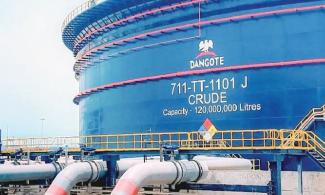Oil marketers in Nigeria have vehemently denied allegations by the Dangote Petroleum Refinery that dealers are importing off-spec Premium Motor Spirit (PMS), widely known as petrol, into the country. The accusations, which were made by the refinery on Tuesday, claimed that deregulation in the downstream oil sector is being misused to import substandard products that could undermine Nigeria’s national interests.
Responding to these claims, Robert Dickerman, the Managing Director of Pinnacle Oil and Gas Limited, called the accusations “defamatory” and “intentionally misleading.” Pinnacle, which has a 13-year agreement with the Dangote Refinery to distribute its petroleum products via pipelines, stressed that it follows strict protocols to ensure the quality of the products it imports and distributes. According to Dickerman, independent inspectors, including the Nigerian Midstream and Downstream Petroleum Regulatory Authority (NMDPRA) and the Standards Organisation of Nigeria (SON), are involved in the inspection of the products at every stage.
“Importing off-spec products is not possible under our watch,” Dickerman stated at a press conference in Lagos. He further explained that Pinnacle works closely with these regulatory bodies to maintain transparency, with products being tested at multiple stages: when the vessel first arrives at Atlas Cove, upon discharge at the point of delivery, and before being loaded into storage tanks.
A senior official from SON confirmed Dickerman’s statements, revealing that the agency operates its own laboratory for testing the quality of imported petroleum products to ensure they meet regulatory standards. “Yes, we are involved in the testing of petroleum products when they come into the country. We have our laboratory where these tests are conducted to ensure they are within specifications,” the official said.
In addition to confirming the regulatory process, the official also pointed out that the NMDPRA is equally diligent, performing tests both when products arrive at ports and before they are distributed into the national supply. The NMDPRA’s rigorous quality assurance process is designed to safeguard against the entry of substandard products into the market.
The disagreement arose after Dangote Petroleum Refinery issued a statement accusing Pinnacle Oil of attempting to blend off-spec products with its “high-quality” fuel at its facilities. According to Dangote, Pinnacle’s representatives had allegedly sought an extension of pipeline access to facilitate this blending process. Pinnacle has strongly refuted this claim, calling it both inaccurate and damaging to their reputation.
On his part, Dickerman clarified that Pinnacle’s interest in the pipeline project was strictly to improve efficiency and reduce the cost of fuel distribution. “Pipeline transfer is far less costly than distributing fuel by truck or ship across the country,” he explained. He also confirmed that the refinery had fully supported the pipeline initiative, having signed an interconnection agreement with Pinnacle in early 2023. The agreement was the result of two years of discussions, including engineering design and securing regulatory approvals.
The issues surrounding fuel imports and distribution are compounded by Nigeria’s ongoing efforts to deregulate the downstream oil sector. While this move is intended to make the market more competitive and efficient, it has also raised concerns about quality control and the potential for unscrupulous practices. However, Pinnacle’s response highlights the importance of regulatory oversight, with both SON and NMDPRA playing essential roles in maintaining industry standards.
Meanwhile, the Nigerian National Petroleum Company (NNPC) has also found itself addressing a separate but related issue. A viral video recently claimed that NNPC was dispensing dirty fuel from one of its retail outlets. The company swiftly debunked the allegations, with spokesperson Olufemi Soneye asserting that the claim was false. “We have carried out spot checks at all our outlets and found this claim to be untrue. NNPC Retail Ltd does not dispense petroleum products into bottles or jerrycans, as depicted in the video,” Soneye said. The NNPC reiterated that it adheres to rigorous quality control measures at all stages of its operations, ensuring that only high-quality fuel reaches consumers.
This back-and-forth between the key players in Nigeria’s oil sector underscores the high stakes involved in the country’s energy market. As the nation works toward stabilizing its petroleum industry, stakeholders, including regulators, marketers, and the government, must collaborate to maintain trust in the sector. The success of the deregulation process hinges on transparency and strict adherence to quality standards to ensure that both the economy and consumers benefit from a well-regulated and efficiently managed fuel supply chain.
With ongoing developments and such public disputes, it is clear that the oil sector in Nigeria faces a period of critical transformation. As the market continues to evolve, the commitment of both government agencies and private sector players to enforce quality control and uphold national interests will be key to achieving long-term success.










